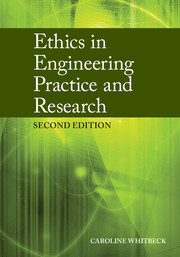Book contents
- Frontmatter
- Contents
- Note to Students
- Foreword to the First Edition
- Preface to the First Edition
- Acknowledgment
- Acknowledgments to the First Edition
- Part 1 Values and the Evaluation of Acts in Engineering
- Introduction to Ethical Reasoning and Engineer Ethics
- 1 Professional Practice in Engineering
- 2 Two Examples of Professional Behavior: Roger Boisjoly and William LeMessurier
- Part 2 Engineering Responsibility
- Part 3 Responsible Research Conduct
- Part 4 The Future of Engineering
- References
- Index
- References
1 - Professional Practice in Engineering
Published online by Cambridge University Press: 05 June 2012
- Frontmatter
- Contents
- Note to Students
- Foreword to the First Edition
- Preface to the First Edition
- Acknowledgment
- Acknowledgments to the First Edition
- Part 1 Values and the Evaluation of Acts in Engineering
- Introduction to Ethical Reasoning and Engineer Ethics
- 1 Professional Practice in Engineering
- 2 Two Examples of Professional Behavior: Roger Boisjoly and William LeMessurier
- Part 2 Engineering Responsibility
- Part 3 Responsible Research Conduct
- Part 4 The Future of Engineering
- References
- Index
- References
Summary
Professions and Norms of Professional Conduct
You chose engineering with the hope of being able to address the need for energy sources that do not pollute the environment or contribute to climate change. Your interests have brought you to a project that addresses the fundamental drawback to solar energy: the lack of a cheap and efficient way to store that energy. Your R&D group has been looking to the photosynthesis of plants for a model of how this is accomplished. The group is making good progress on developing a process to use the sun's energy to split water into hydrogen and oxygen. These gases could later be recombined in a fuel cell to create electrical energy for a variety of uses including powering an automobile.
You have the technical work well in hand and you are confident that you are doing work that is likely to benefit society. However, you are wondering what it means that you are a professional and what the implications of being a professional are for the way you and other team members handle the rewards for making this breakthrough. (For example, what you owe to the company for which you previously worked and at which you first worked on a similar problem; what you should expect in the way of credit to you personally for the contribution you have made to this project.) Where do you begin finding out what you need to know about your rights and responsibilities as a professional?
Professions are those occupations that both require advanced study and mastery of a specialized body of knowledge, and undertake to promote, ensure, or safeguard some aspect of others??? well-being. This chapter examines the norms and standards of good conduct in professional practice. Ethical (and sometimes legal) requirements also exist for nonprofessionals when their work immediately affects the public good. For example, food handlers are bound by sanitary rules. Arguably, many moral rules apply equally in all work contexts. All should be honest, for example. What is distinctive about the ethical demands professions make on their practitioners is the combination of the responsibility for some aspect of others??? well-being and the complexity of the knowledge and information that they must integrate in acting to promote that well-being.
- Type
- Chapter
- Information
- Ethics in Engineering Practice and Research , pp. 77 - 104Publisher: Cambridge University PressPrint publication year: 2011



